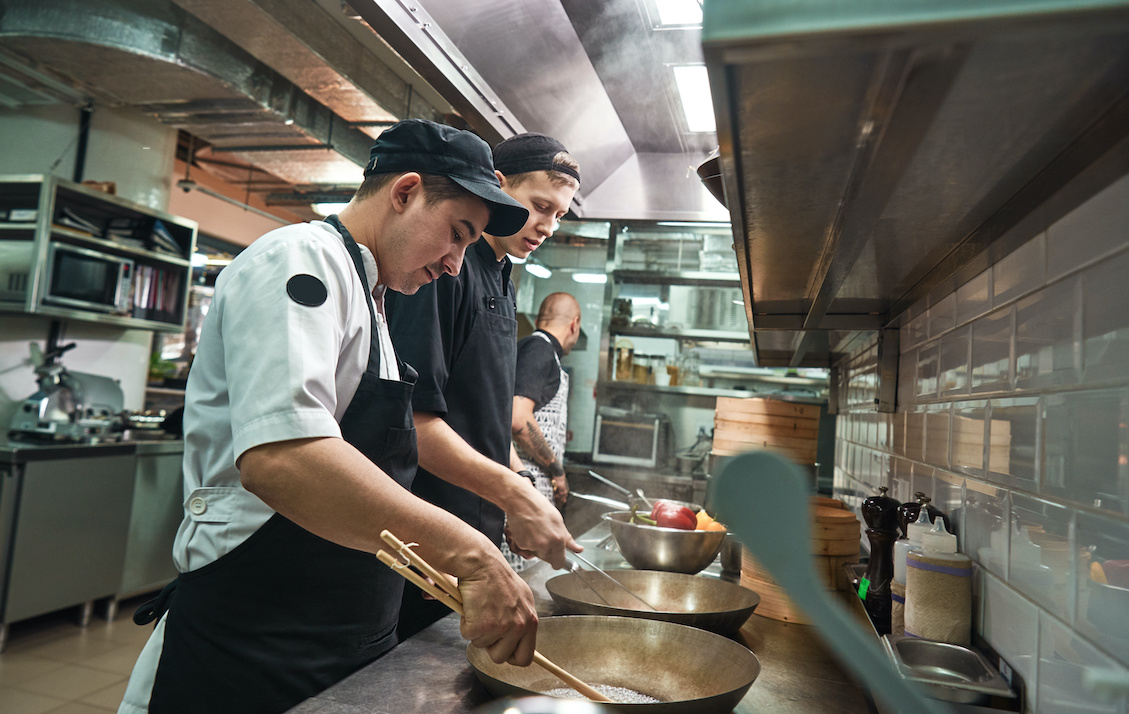Call Sales: +1 (833) 437-3835
Call Sales: +1 (833) 437-3835
Revel Systems | April 6, 2021 |

Sadly, the effects of COVID-19 has been extremely damaging to many restaurants, forcing them to close their doors. While this disruption has been difficult for the entire hospitality industry, it has also created an opportunity for the ‘ghost kitchen’ or ‘delivery-only restaurant.’
A successful restaurant’s kitchen is typically bustling when the house is full. Many ghost kitchen brands don’t even have a physical premise where customers can come and dine.
Instead, they operate out of a kitchen only, taking orders through their app or websites and then fulfilling orders with a fleet of dedicated delivery drivers or freelancers like GrubHub.
Ghost kitchen companies specialize in delivery-only restaurants. All their branding is created virtually, and they market themselves online.
A ghost kitchen is essentially a restaurant without a dining space. Their primary purpose is to create and fulfill online food orders and use third-party delivery apps such as UberEats, DoorDash, and Grubhub. Some operate as take-out-only restaurants.
The concept of ghost kitchens is relatively new, and there isn’t a set definition of the term just yet. However, ghost kitchens share some common traits:
Some ghost kitchen facilities are not housed within restaurants, so their primary focus is delivery services. There could be several independent brands sharing one cooking facility, or multiple brands could be operated by the same management team.
Some successful restaurant brands have launched successful ‘ghost kitchen’ spin-off services, and they’re using their current kitchens to facilitate these brands.
Restaurants that have closed as a result of COVID-19 are accommodating ghost kitchen brands that require equipment and space.
This helps create fresh revenue streams for restaurants while boosting the ‘ghost kitchen’ brand visibility.
The COVID-19 pandemic has rapidly accelerated the growth of ghost kitchens and cooking facilities that produce delivery-only meals. Euromonitor has predicted the ghost kitchen concept will be a $1 trillion global market by 2030. In fact, ghost kitchens could offer a sustainable business model for the struggling restaurant industry.
They can provide revenue to closed businesses, help brands maintain cash flow, and provide additional dining options for hungry food lovers.
Whereas traditional restaurants can cost millions of dollars to finance, ghost kitchens can be started for as little as $20,000.
There are two primary forms that ghost kitchens take:
In this business model, ghost kitchen brands rent a space in a shared kitchen, often working alongside 10-20 other delivery-only brands.
This is a similar business model to WeWork, but mini-kitchens each host their unique food brands rather than offices.
Although shared kitchens have existed for many years, a wave of foodie entrepreneurs makes sure that ghost kitchens are more available and affordable than ever before.
There is a myriad of well-established restaurants that don’t want to outsource a unique ghost kitchen experience. They prefer to run delivery-only concepts from their existing locations.
While some of these restaurants operate their ghost kitchens under their leading brand, others create new concepts and try out different food styles and creative menus.
Frato’s Pizza in Chicago has been serving pizza to dine-in customers for many years. In recent months, the owner has launched four ‘ghost kitchens’ from one premise.
This includes a milkshake concept and a grilled cheese concept. While the main pizza restaurant is delivering business as usual, the four ghost kitchens operate as delivery only.
In LA, Fatburger has decided to use all its stores as ghost kitchens for ‘Hurricane Grill and Wings,’ its sister brand. This new concept offers west coast fans of the east coast chain an opportunity to enjoy Hurricane meals.
However, in-store Fatburger guests are not aware that a different brand is operating from the premises. Hence, the term ghost kitchen.
Famous brands such as Dog Haus, Wow Bao, and The Halal Guys are also implementing the ghost kitchen model successfully. This virtual kitchen concept is helping restaurants to cut costs and increase profits as the pandemic continues.
A successful ghost kitchen can be an excellent business venture throughout the remaining days of COVID-19 disruptions and beyond.
Revel’s employee and kitchen management tools work to streamline communications between customers and businesses. Revel's restaurant POS features offer the technology needed to create seamless communications, so staff have more time to focus on the things that matter, like service, delivery, and safety.
With Revel Systems, you can leverage the most versatile POS platform on the market today. Easily scalable, and quick and easy to deploy, Revel is equipped with the tools you need to run a successful restaurant business.
Contact us for a free demo today!